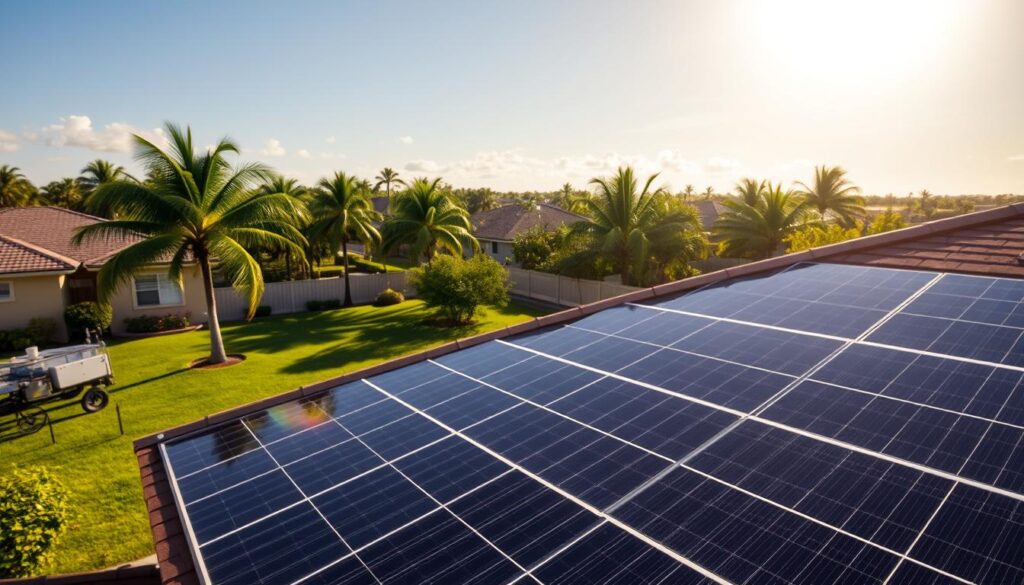Florida ranks third nationally for solar panel installations, trailing only California and Texas. While the government doesn’t pay for solar panels outright, significant incentives reduce costs. Homeowners in Florida can access federal tax credits, state exemptions, and local programs to offset expenses. The question of government assistance for solar panels in florida often arises, but it’s important to clarify: no program offers fully free panels. Instead, federal and local policies make solar more affordable.
The Sunshine State’s solar boom continues, with a 28% rise in 2023. Key programs include the 30% federal tax credit, sales tax exemptions, and property tax breaks. Misleading claims about “free” panels persist, but this article explains real options. Understanding these incentives helps homeowners decide if solar fits their budget.
Key Takeaways
- Florida’s third-place solar ranking reflects strong growth, but does the government pay for solar panels in florida remains a myth.
- Federal tax credits cover up to 30% of installation costs through 2032.
- No state tax credits exist since Florida lacks a personal income tax.
- Local programs like Dunedin’s Solar Energy Rebate Grant offer additional support.
- Property and sales taxes don’t apply to solar equipment in Florida.
Understanding Solar Panel Incentives in Florida
Florida residents exploring solar power often wonder what support options exist. Solar panel incentives in florida come from multiple sources, streamlining costs and encouraging adoption. The state’s programs work alongside federal policies to make installations more affordable.
Government rebates and incentives reduce upfront expenses while boosting long-term savings. Here’s how they break down:
Overview of Government Incentives
Federal, state, and local programs create a layered support system. Key types include:
- Tax credits (direct reductions on owed taxes)
- Sales and property tax exemptions
- Utility company rebates
- Net metering agreements
Federal Tax Credit for Solar Panels
The Residential Clean Energy Credit currently covers 30% of installation costs through 2032. After 2034, this credit phases out entirely. For example:
| Year of Installation | Tax Credit Rate |
|---|---|
| 2022-2032 | 30% |
| 2033 | 26% |
| 2034 | 22% |
A $20,000 system installed in 2024 would qualify for a $6,000 federal credit. This directly lowers tax bills, easing financial strain.
State and Local Programs
Florida government rebates for solar panels extend beyond federal offerings. State law exempts solar equipment from sales tax entirely. Property tax exemptions ensure solar systems don’t increase home assessments. Major utilities like Florida Power & Light and Duke Energy also offer net metering, letting households earn credits for excess energy sent to the grid.
Check local utility websites for rebates or grants. Municipalities like Gainesville and Tallahassee often provide additional support for residents.
Federal Tax Credit: What You Need to Know

Florida residents can cut solar panel costs using federal tax credits. The Residential Clean Energy Credit offers 30% savings on eligible expenses through 2032. This tax credit directly lowers your tax bill, helping offset installation costs. Let’s break down how to qualify and claim it.
To use these florida solar energy tax credits, you must:
- Own your solar system (leases or PPAs don’t qualify)
- Install systems by December 31, 2034
- Use equipment meeting safety codes
- Live in the U.S. (vacation homes qualify but prorated based on usage)
Batteries qualify if they store at least 3 kWh (since 2023). Solar water heaters must derive ≥50% energy from sunlight. Rentals and commercial spaces aren’t eligible.
Follow these steps to claim your credit:
- Collect invoices from installers showing total costs
- Fill out IRS Form 5695 detailing expenses
- Attach Form 5695 to your federal tax return
| Year | Tax Credit Percentage |
|---|---|
| 2022–2032 | 30% |
| 2033 | 26% |
| 2034 | 22% |
Unused credits roll over to next years. Note: This isn’t a government check—the credit reducesstaxes owed. Even if you don’t owe taxes, leftover credit stays available for future filings.
Does the government pay for solar panels in florida? No—it offers tax breaks instead. But with proper planning, this credit makes solar systems more affordable than you think.
Florida Solar Energy Policies
Florida’s policies simplify solar adoption through programs like net metering and oversight by regulators. With a 28% jump in solar installations in 2023, these rules ensure residents benefit from reliable incentives.
Net Metering Explained
Net metering lets homeowners earn credits for excess energy sent to the grid. In solar panel incentives in florida, four major utilities—FPL, Duke Energy, TECO, and Gulf Power—provide 1:1 retail credit. Here’s how it works:
- Credits match the utility’s electricity rate, not cash
- Credits reset yearly, so unused energy loses value after 12 months
- Applies to all four investor-owned utilities plus cooperatives
The Role of the Florida Public Service Commission
This agency enforces solar policies like net metering rules. The FPSC ensures utilities comply with state laws and oversees programs like the florida solar rebate program in local areas. While no statewide rebates exist, cities like Dunedin offer grants for solar users. The commission also reviews utility fees and interconnection standards to keep costs fair for solar adopters.
State-Level Incentives for Solar Users
Florida government rebates for solar panels often take center stage, but state-level tax exemptions quietly cut costs too. These policies form part of government assistance for solar panels in florida, offering tangible savings without requiring complex paperwork.
$218 annually at Florida’s average 0.91% rate. This applies to batteries too, shielding storage investments from taxation.
| Incentive | Annual Savings | Eligibility |
|---|---|---|
| Property Tax Exemption | $218+ per year | Certified systems only |
| Sales Tax Exemption | $1,440 upfront | FSEC-certified components |
These exemptions stack with federal credits, creating a layered savings structure. While rebates vary by city, state tax breaks ensure long-term cost reductions. Check local programs for additional rebates like Boynton Beach’s $1,500 incentive for larger systems.
Combined with net metering policies, these exemptions make solar a financially smart choice. Start by verifying equipment qualifies with the Florida Solar Energy Center to unlock all benefits.
Local Grant Programs and Rebates
Many Florida communities and utilities offer additional florida solar rebate program options to residents. Cities like Boynton Beach, Dunedin, and Tallahassee have launched tailored initiatives, making solar more accessible through direct rebates and grants. These localized programs vary but often target energy efficiency and cost savings for homeowners.

Community Solar Initiatives
Some cities run solar panel grants in florida to boost adoption. For instance:
- Boynton Beach’s Energy Edge Rebate Program awards $1,500 for 5kW+ solar systems with 17.5% efficiency.
- Dunedin’s Solar Energy Grant Program provides up to $2,500 at 25 cents per watt installed.
- Tallahassee’s municipal program offers free solar assessments for low-income households.
Utility Company Incentives
Utilities like Florida Keys Electric Cooperative and JEA provide targeted support:
- Florida Keys Electric Cooperative offers DER system loans up to $35,000.
- Jacksonville JEA grants $4,000 rebates for qualifying solar batteries.
- Orlando OUC offers $2,000 for solar thermal systems and $900 for water heating upgrades.
While these programs are region-specific, they highlight opportunities for residents to reduce upfront costs. Check local utility websites or community offices to explore eligibility. These florida solar rebate program and solar panel grants in florida options can lower system costs by thousands—making solar a smarter investment.
Financing Options for Solar Panel Installation
Choosing the right way to finance solar panels in florida depends on your budget and goals. Homeowners have flexible options to spread costs over time while still accessing solar panel incentives in florida. Let’s break down the choices:
Solar Loans
Loans offer ownership of panels while spreading payments. Key options include:
| Program | Type | Features |
|---|---|---|
| PACE Financing | Property Tax Loan | Financing up to 100% of system cost, repaid over 15-25 years |
| SELF Loans | Renewable Energy Loans | Fixed rates 5%-9.5%, terms 3-20 years, no collateral required |
| Home Equity Loans | Traditional Financing | Lower rates for existing homeowners, tax-deductible interest |
Power Purchase Agreements (PPAs)
PPAs let you pay only for energy produced. Companies install systems at no upfront cost. However, you miss out on federal tax credits and property value gains. Leases often lock users into long-term contracts, risking higher total costs over time.
Compare options wisely. For example, a $25,200 system at $3/watt could cost $17,640 after the 30% federal tax credit. A PACE loan might spread this cost over 20 years, while a PPA might charge $100/month for energy. Weigh long-term savings against ownership benefits.
Choosing the Right Solar Panel System
When exploring does the government pay for solar panels in Florida, remember incentives like solar panel grants in Florida can lower costs, but selecting the right system starts with your needs. Florida’s climate demands durable, efficient panels. Monocrystalline panels offer high efficiency at higher costs, ideal for smaller roofs. Polycrystalline is budget-friendly but takes more space. Thin-film panels are flexible but less efficient in hot weather.
- Monocrystalline: 15–22% efficiency, best for limited space.
- Polycrystalline: 13–17% efficiency, cost-effective for larger roofs.
- Thin-film: Lightweight and versatile but needs more sun exposure.

Evaluating energy needs begins with your home’s usage. Check past electric bills to estimate daily kWh use. A 5kW system in Florida costs around $10,548 before tax credits. South-facing roofs with minimal shading maximize output. Smaller systems may qualify for grants but might not fully offset bills. Match system size to your usage to optimize rebates like the solar panel grants in Florida.
Florida’s median cost per watt is $2.11, so a 10kW system starts at $21,100. Pairing with energy-efficient appliances reduces required panel size. Proper sizing ensures eligibility for incentives and faster ROI—typically 8 years in Florida. Start by auditing your energy habits to align with available programs and long-term savings.
Common Misconceptions About Solar Incentives
Solar energy programs in Florida offer real savings, but myths about their benefits can mislead. Let’s clarify two widespread misunderstandings to help you choose wisely.
“The Government Covers All Costs”
“Solar panels are free through government programs!”
While government assistance for solar panels in florida reduces costs, it doesn’t erase them. The federal tax credit covers 30% of installation costs (up to 2025). For a $20,000 system, this saves $6,000. However, you still pay the remaining amount. Many “free” offers involve leases or power purchase agreements, which often exclude tax credits or ownership. Always verify if a deal includes florida solar energy tax credits or requires third-party ownership.
“Only Big Houses Can Benefit”
Small homes can save too! A 4kW system might slash a modest home’s bills by 70%. Florida solar energy tax credits apply to all eligible systems, regardless of home size. Net metering ensures excess energy earns utility credits, and tax breaks apply to any size installation. Even a small system can offset costs over time.
- Custom systems match small homes’ energy needs without overspending.
- Tax incentives reduce costs for all homeowners, not just large properties.
- Net metering credits apply to every kWh produced, no matter the system size.
Properly sized systems save money and qualify for incentives, makinging solar accessible to all home sizes.
Steps to Get Started with Solar Panels
Starting your solar journey in Florida means taking advantage of incentives while finding the right fit for your home. Begin by exploring how federal and state programs like the ITC and local rebates can reduce upfront costs. Here’s how to proceed:
Researching Solar Providers
Look for licensed installers familiar with financing solar panels in florida. Check credentials through the Florida Solar Energy Center and verify experience with florida government rebates for solar panels. Ask providers about local programs, such as Jacksonville’s $2,000 battery rebate or Tallahassee’s low-interest loans. Confirm they handle ITC paperwork and explain sales tax exemptions.
Getting Quotes and Assessing Options
Request detailed quotes comparing costs, warranties, and payment plans. Factor in the 30% ITC and Florida’s property tax abatement. Compare offers from at least three installers to ensure fair pricing. Explore PACE loans or PPAs if upfront costs are a concern. Review net metering terms to understand how excess energy credits work. Always confirm systems qualify for rebates and tax credits before finalizing.
A well-researched decision today can secure long-term savings. Start by contacting qualified installers and use online tools like EnergySage to compare offers. With the right planning, solar can align with your budget and energy goals.
